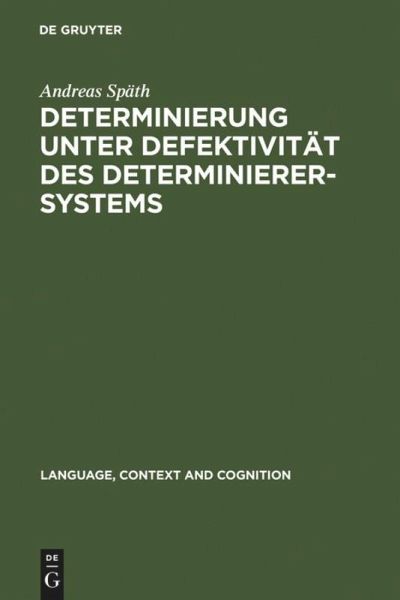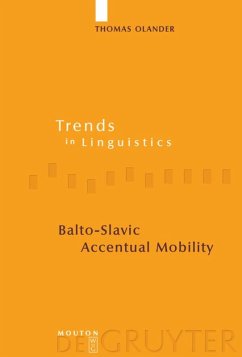
Determinierung unter Defektivität des Determinierersystems
Informationsstrukturelle und aspektuelle Voraussetzungen der Nominalreferenz slawischer Sprachen im Vergleich zum Deutschen

PAYBACK Punkte
0 °P sammeln!
The monograph explains how the lack of a â??nominal articleâ?? category in some Slavic languages influences nominal reference and textual coherence. The book demonstrates that the missing category cannot be represented by the absence of the functional category D0, but that a phonologically empty category with the meaning of the semantic default determiner must be assumed. Otherwise, syntactically and semantically well-formed sentences could not be generated. The semantic default determiner is only specified contextually when the DP with a fixed function in a sentence combines the aspect of the verb and a defined position within the information structure of the sentence. These factors establish the reference of the DPs as well as their discourse-pragmatic potential.
The book follows the two-level semantic system of the modular grammars of the Slavic languages. The syntactic structures are mapped onto compositionally constructed semantic structures that are interpreted conceptually. This means that grammatical knowledge is strictly separated from extra-linguistic knowledge, which helps to interpret the utterance meanings in coherent texts.
The book follows the two-level semantic system of the modular grammars of the Slavic languages. The syntactic structures are mapped onto compositionally constructed semantic structures that are interpreted conceptually. This means that grammatical knowledge is strictly separated from extra-linguistic knowledge, which helps to interpret the utterance meanings in coherent texts.
Die Monographie geht der Frage nach, welchen Einfluss die defektive Kategorie des Artikels in den slawischen Sprachen auf die Nominalreferenz sowie auf die Bildung kohärenter Äußerungsfolgen hat. Zunächst wurde gezeigt, dass ein fehlender Determinierer nicht die Abwesenheit der funktionalen Kategorie D bedeutet, sondern dass ein phonologisch leerer Default-Determinierer angenommen werden muss, welcher für die Bildung syntaktisch und semantisch wohlgeformter Strukturen unerlässlich ist. In Interaktion mit dem informationsstrukturellen Status und dem Verb kann die semantisch unterspezifizierte und per default determinierte DP im Satzkontext hinsichtlich ihrer nominalreferentiellen und diskurspragmatischen Potentials konzeptuell angereichert werden. Die Arbeit folgt einer Grammatikkonzeption, welche dem modularen Aufbau des Sprachsystems sowie der Zwei-Ebenen-Semantik verpflichtet ist. Das Buch unterscheidet sich von früheren Arbeiten zu diesem Problem in der Berücksichtigung der Interaktion der Sprachebenen, insbesondere mit Blick auf die Abbildung syntaktischer Strukturen in kompositional aufgebaute semantische Repräsentationen. Daraus resultiert eine strikte Trennung in sprachliches und nichtsprachliches Wissen, was ermöglicht, den Anteil außersprachlicher Informationen an der Äußerungsbedeutung herauszustellen.








![Die slavischen Sprachen / The Slavic Languages, Halbband 2, Handbücher zur Sprach- und Kommunikationswissenschaft / Handbooks of Linguistics and Communication Science [HSK] 32/2 Cover Die slavischen Sprachen / The Slavic Languages, Halbband 2, Handbücher zur Sprach- und Kommunikationswissenschaft / Handbooks of Linguistics and Communication Science [HSK] 32/2](https://bilder.buecher.de/produkte/41/41584/41584363n.jpg)





